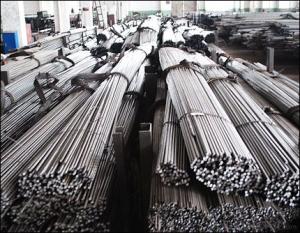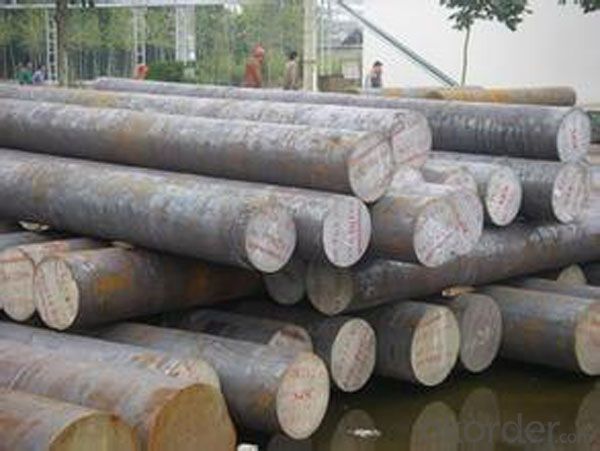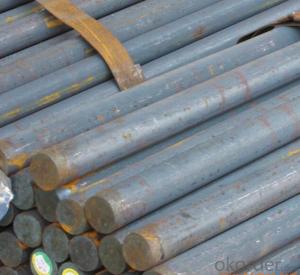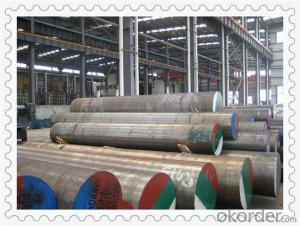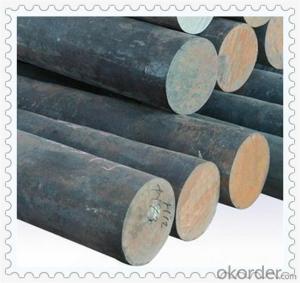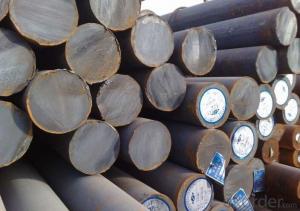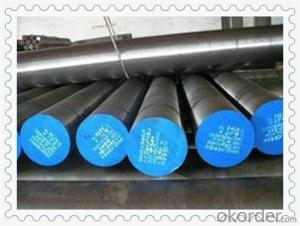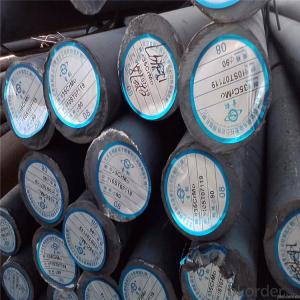S45C Carbon Steel 1045 Carbon Steel Bar
- Loading Port:
- China main port
- Payment Terms:
- TT OR LC
- Min Order Qty:
- 30 m.t.
- Supply Capability:
- 10000 m.t./month
OKorder Service Pledge
OKorder Financial Service
You Might Also Like
Specification
S45C Carbon Steel 1045 Carbon Steel Bar
Product Information:
Heat treatment of c45 carbon steel
1.Quench:1000-1040`C via 600`C and 850`C, preheating oil or wind cooling
2.Temper temperature should be higher than working temperature in order to stabilize the working size of mold
3.Heat up to 650°C of average temperature in order to eliminate the machined stress, 500 °c air cooling after electric cooker cooling
4.Tempering, 800-850 °c ,slow cooling after diathermia
5. Melting Process of SKD61 steel rod
EAF: Electric Furnace+LF+VD(Optional)
Application of c45 carbon steel
(1)Can be used in many fields such as building, automobile, shipbuilding, petrochemical, machinery, medicine,
food, electric power, energy, space, building and decoration, etc.
(2) Can be made into mould template, mortise pin, column
(3)This kind of steel have good mechanical property, is widely used in structural parts which may support
stress alternation, especially made into some connecting rods, bolts, wheel gear...
(4) This kind of steel is the most common blanks and materials of shaft part
Product Overviews:
| Product Name | Typical Grades | Diameter(mm) | Standard adopted |
| Carbon Steel | 20 (1020/S20C/C22) | Ø16-Ø300 | GB/SAE/JIS/DIN |
| 40 (1040/S40C/C40) | |||
| 45 (1045/S45C/C45) | |||
| Bearing Steel | GCr9 (51100/SUJ1) | Ø12-Ø250 | |
| GCr15 (52100/SUJ2/100Gr6) | |||
| GCr9SiMn (A485-Gr.1/SUJ3) | |||
| Cr-Mo Steel | 20Cr (5120/SCr420H/20Cr4) | Ø12-Ø250 | |
| 40Cr (5140/SCr440/41Cr4) | |||
| 42CrMo(4140/SCM440/42CrMo4) | |||
| Gear Steel | 20CrNiMo | Ø16-Ø600 | |
| 20CrMn(5115/SMnC420/20MnCr5) | |||
| 20CrNiMo(8620/SNCM220/20CrMiMo2) |
Product Show:

Our Advantages:
· Industry experience over 20 years.
· Shipment of goods -More than 70 countries worldwide.
· The most convenient transport and prompt delivery.
· Competitive price with best service.
· High technical production line with top quality products.
· High reputation based on best quality products.
With our experienced, enthusiastic and dynamic staffs, we assure to bring you the products with best quality, reasonable prices and good after-sales services under the motto: Friends First, Business After.
Communication, Experience, Expertise and Best efforts are our Promises to you.
- Q: How does special steel contribute to the heavy equipment industry?
- Special steel contributes to the heavy equipment industry by offering enhanced strength, durability, and resistance to wear and tear. It enables the production of high-performance components and parts, such as gears, axles, and blades, that can withstand heavy loads, extreme temperatures, and harsh environments. The use of special steel in heavy equipment ensures improved safety, increased productivity, and longer service life, making it a critical material for the industry.
- Q: How does special steel perform in terms of corrosion resistance in marine environments?
- In marine environments, special steel, also known as stainless steel, exhibits exceptional performance in terms of resisting corrosion. This is mainly attributed to the high levels of chromium and nickel present in its alloy composition. The chromium content creates a protective oxide layer on the steel's surface, commonly referred to as the passive layer. Acting as a shield, this layer prevents direct contact between the steel and corrosive elements found in marine environments, such as saltwater. Furthermore, the presence of nickel enhances the corrosion resistance of special steel. Nickel not only improves the stability of the passive layer but also increases its ability to self-repair if it becomes damaged. This property makes special steel highly reliable and long-lasting, especially in marine environments where the steel is exposed to saltwater, high humidity, and fluctuating temperatures that can accelerate corrosion processes. Moreover, special steel offers excellent resistance to two common types of corrosion encountered in marine environments: pitting corrosion and crevice corrosion. Pitting corrosion occurs when localized areas of the steel's surface are attacked, resulting in small pits or holes. Crevice corrosion, on the other hand, takes place in confined spaces such as gaps or joints, where stagnant water or debris can accumulate and expedite corrosion. By effectively resisting these types of corrosion, special steel ensures its durability and integrity in marine applications. Overall, the high chromium and nickel content of special steel contribute to its outstanding corrosion resistance in marine environments. Its ability to form a protective passive layer, resist pitting and crevice corrosion, and self-repair makes it the preferred choice for various marine applications, including shipbuilding, offshore structures, and seawater desalination plants.
- Q: Can special steel be used in the aerospace defense industry?
- Yes, special steel can be used in the aerospace defense industry. Special steel alloys, such as titanium, stainless steel, and nickel-based alloys, are commonly used in aerospace applications due to their exceptional strength, corrosion resistance, and high-temperature capabilities. These materials are often employed in manufacturing aircraft components, rocket engines, missile systems, and other defense-related structures to ensure superior performance and durability in extreme conditions.
- Q: What are the different machining techniques for special steel?
- There are several machining techniques specifically used for special steel, such as turning, milling, drilling, and grinding. Each technique involves different tools and processes to shape and cut the steel, depending on the required specifications and desired outcome. Additionally, other specialized techniques like electrical discharge machining (EDM) and laser cutting can also be utilized for special steel machining.
- Q: How does special steel contribute to the automotive parts industry?
- Special steel plays a crucial role in the automotive parts industry by providing enhanced strength, durability, and performance to various components used in vehicles. With its unique properties, special steel helps in improving the overall safety, reliability, and efficiency of automobiles. One of the key contributions of special steel to the automotive parts industry is its ability to withstand high temperatures, pressures, and extreme conditions. This makes it ideal for manufacturing engine parts such as crankshafts, camshafts, and connecting rods, which are subject to intense mechanical stress and heat. Special steel ensures that these critical components can endure the demanding conditions of combustion engines, resulting in improved engine performance and longevity. Another significant contribution of special steel is its corrosion resistance. Automotive parts are exposed to various corrosive elements like moisture, chemicals, and road salt. Special steel enables the production of corrosion-resistant parts such as exhaust systems, suspension components, and brake rotors, which are vital for maintaining the structural integrity and safety of vehicles over time. Moreover, special steel offers exceptional formability and weldability, allowing manufacturers to produce complex automotive parts with precision and ease. This versatility makes it possible to create lightweight yet strong components like chassis, body panels, and suspension arms, which contribute to fuel efficiency, handling, and overall vehicle performance. Furthermore, special steel's high tensile strength and toughness contribute to the safety of vehicles by ensuring the structural integrity of safety-critical parts such as steering columns, seat frames, and roll bars. These components play a vital role in protecting occupants during accidents and collisions, making special steel an essential material for enhancing overall vehicle safety. In conclusion, special steel's unique properties and characteristics significantly contribute to the automotive parts industry. Its strength, durability, corrosion resistance, formability, and weldability make it an ideal material for manufacturing critical components in automobiles. By incorporating special steel into various parts, vehicles can achieve improved performance, safety, and reliability while meeting the demands of modern automotive standards.
- Q: What are the limitations of welding special steel?
- Considerations need to be made for several limitations associated with welding special steel. Firstly, special steel, such as high-alloy steels or heat-resistant steels, often contains higher levels of carbon, which increases the risk of cracking during welding. To minimize this risk, it is necessary to carefully control preheating, interpass temperature, and post-weld heat treatment. Another limitation is the potential for distortion and warping during welding. Special steels have different thermal conductivity and expansion coefficients compared to carbon steels, causing them to dissipate heat more quickly and be more susceptible to distortion. To minimize these effects, proper clamping and fixturing techniques are required. Impurities, such as sulfur and phosphorus, can also affect special steels, leading to the formation of brittle compounds during welding. To prevent this, it is essential to use high-quality filler materials and ensure the cleanliness of the base metal. Specific welding techniques and parameters are often necessary for special steels. For example, some high-alloy steels require slow cooling rates to avoid the formation of brittle microstructures. This may involve specialized cooling methods like post-weld heat treatment or controlled cooling rates. Lastly, the cost of special steels is generally higher than that of carbon steels, which can limit their use in certain applications with budget constraints. Overall, although special steels offer enhanced properties for specific applications, their welding process requires careful consideration and adherence to specific procedures to overcome the limitations related to cracking, distortion, impurities, and cost.
- Q: How is wear-resistant steel used in mining equipment?
- Wear-resistant steel is commonly used in mining equipment to enhance their durability and longevity. It is specifically designed to withstand the harsh conditions and abrasive environments typically found in mining operations. Components such as buckets, blades, chutes, crushers, and screens are often made from wear-resistant steel to prevent excessive wear and damage caused by rocks, minerals, and other abrasive materials. This steel's high hardness and toughness properties ensure that the equipment can withstand the constant impact and abrasion, reducing maintenance needs and extending the equipment's lifespan.
- Q: How does special steel resist fatigue?
- Special steel is designed to resist fatigue by incorporating specific properties that enhance its durability and strength. One of the primary factors that allows special steel to resist fatigue is its high tensile strength. This means that the steel can withstand large amounts of stress and load without deforming or breaking, which is crucial in preventing the initiation and propagation of fatigue cracks. Additionally, special steel often undergoes specific heat treatment processes, such as quenching and tempering, to further enhance its resistance to fatigue. This heat treatment modifies the microstructure of the steel, creating a fine and uniform grain structure that improves its mechanical properties. It increases the steel's hardness and toughness, making it less susceptible to fatigue failure. Furthermore, special steel can also contain alloying elements such as chromium, molybdenum, and vanadium, which contribute to its fatigue resistance. These alloying elements form carbides and other strengthening phases within the steel, resulting in improved hardness, strength, and resistance to fatigue crack propagation. Moreover, special steel can undergo specialized surface treatments, such as shot peening or nitriding. Shot peening bombards the steel surface with small metal particles, inducing compressive residual stresses. These compressive stresses counteract the tensile stresses that cause fatigue cracks, thus enhancing fatigue resistance. Nitriding involves diffusing nitrogen into the steel surface, creating a hardened layer that improves wear resistance and, consequently, fatigue resistance. In summary, special steel resists fatigue through a combination of factors, including high tensile strength, specific heat treatment processes, alloying elements, and specialized surface treatments. These properties work together to enhance the steel's durability, strength, and resistance to fatigue crack initiation and propagation, making it a reliable and long-lasting material in various applications.
- Q: How does special steel contribute to the defense aftermarket industry?
- Special steel plays a crucial role in the defense aftermarket industry by providing high-quality materials that are essential for the production of various defense equipment and components. The unique properties of special steel, such as its exceptional strength, durability, and resistance to corrosion and extreme temperatures, make it a preferred choice for manufacturing military vehicles, aircraft, weapons, and other defense systems. One of the key ways in which special steel contributes to the defense aftermarket industry is through its use in armor and ballistic protection. Special steel alloys are utilized to create armor plates and panels that can withstand high-velocity impacts and protect military personnel and vehicles from enemy fire. These materials offer enhanced protection levels, reducing the risk of casualties and damage during combat. Moreover, special steel is also employed in the production of aerospace components. The defense industry heavily relies on aircraft for various operations, including reconnaissance, surveillance, and combat. Special steel alloys are used to manufacture critical components such as landing gear, engine parts, and structural elements, ensuring the safety, reliability, and performance of military aircraft. Furthermore, special steel's resistance to corrosion and extreme conditions makes it suitable for the construction of naval vessels and submarines. These naval assets operate in harsh marine environments, exposed to saltwater, extreme temperatures, and constant mechanical stress. Special steel alloys with high-strength properties and corrosion resistance are utilized in the construction of ship hulls, propeller shafts, and other critical components, ensuring longevity and operational effectiveness. In addition to its direct applications, special steel also contributes to the defense aftermarket industry through its role in the supply chain. The production of defense equipment and components often requires highly specialized machinery and tools, which are made from special steel. The availability of these materials is essential for maintaining a robust defense industry, enabling the efficient production and maintenance of defense systems. Overall, special steel plays a vital role in the defense aftermarket industry by providing the necessary materials for the production of high-performance, reliable, and durable defense equipment. Its unique properties contribute to the safety, effectiveness, and longevity of military vehicles, aircraft, weapons, and naval vessels, ultimately enhancing the capabilities of defense forces around the world.
- Q: What are the different high-pressure grades of special steel?
- There are several different high-pressure grades of special steel, each with its own unique properties and applications. Some of the commonly used high-pressure grades of special steel include: 1. 4130 steel: This grade of steel is known for its excellent strength, toughness, and heat resistance. It is often used in the manufacturing of high-pressure tubing and components for the oil and gas industry. 2. 4340 steel: This grade of steel is known for its exceptional strength and toughness. It is commonly used in the production of high-pressure valves, gears, and other critical components in industries like aerospace, defense, and automotive. 3. 316 stainless steel: This grade of stainless steel is highly corrosion-resistant and has excellent high-temperature properties. It is frequently used in high-pressure applications such as pipelines, heat exchangers, and pressure vessels in chemical and petrochemical industries. 4. 17-4 PH stainless steel: This grade of stainless steel offers a combination of high strength, excellent corrosion resistance, and good toughness. It is often used in high-pressure pump components, turbine blades, and other critical parts in industries like power generation and aerospace. 5. F22 steel: This grade of steel is a low-alloy steel with high-temperature strength and excellent creep resistance. It is commonly used in high-pressure and high-temperature applications such as boilers, pressure vessels, and piping systems in power plants and refineries. These are just a few examples of the high-pressure grades of special steel available. The selection of the appropriate grade depends on the specific requirements of the application, including factors like pressure, temperature, corrosion resistance, and mechanical properties.
Send your message to us
S45C Carbon Steel 1045 Carbon Steel Bar
- Loading Port:
- China main port
- Payment Terms:
- TT OR LC
- Min Order Qty:
- 30 m.t.
- Supply Capability:
- 10000 m.t./month
OKorder Service Pledge
OKorder Financial Service
Similar products
Hot products
Hot Searches
Related keywords
